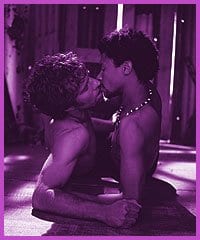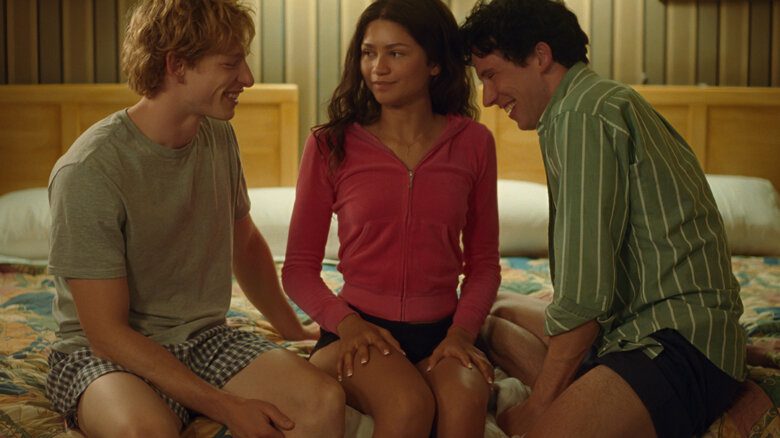John Greyson’s been to jail again for indecent acts.
The Toronto filmmaker owns up to a fixation and a pattern in his work: “Lilies: fantastical faggy prison film. Uncut: fantastical faggy prison film. I can’t seem to get out of prisons!”
His latest feature Proteus began eight years ago in South Africa when Capetown video activist Jack Lewis discovered and translated the 1735 trial transcript of two local prisoners, Dutch sailor Rijkhaart Jacobsz and Cape native Claas Blank, who ran afoul of sodomy laws and managed a decade-long love affair in jail.
They’re caught having sex, brought to trial, tortured till they confess and condemned. Initially under-whelmed when Lewis suggested they make a film of this material, Greyson grew inspired by reading between the lines and imagining motivations and texture for the bare-bones case history.
His version includes roles for two Toronto actors: the prison’s English botanist Niven (Shaun Smyth), who is cultivating South African protea (a type of flower) for the European market; and Kate (Kristen Thomson), the governor’s wife and cousin to Niven. The South African leads are Rouxnet Brown (Claas) and Neil Sandilands (Rijkhaart).
Greyson had met Lewis when Greyson’s Zero Patience showed in Capetown, “I did some workshops, fell in love with the country and kept up a friendship.” The film is a Canadian-South African co-production and Greyson’s first co-directed feature.
“The division of labour became fairly second-nature, often based on language, me doing the English scenes and him doing the Afrikaans and Nama scenes.”
Greyson’s connection to South Africa goes back to his support in 1985 for Simon Nicoli, a jailed, black gay activist. He publicized Nicoli’s case in the 1986 video A Moffie Called Simon.
Greyson says shooting on location, in the actual dungeon, the quarry where prisoners worked mining the slate, the Cape Castle court where they were tried, “was cheaper than it would have been ever to build a set, but also way more powerful and beautiful and complicated.”And emotionally resonating. “Robben Island was very spooky. A place full of ghosts, past and present.”
Look for the casual but pointed anachronisms, something Greyson has done since his earliest features to expand meaning. “The stenographers in the courtroom have beehives, and a prison guard in a 1960s uniform immediately evokes the Robben Island everybody knows of – the ’60s and Nelson Mandela.
“We were trying to talk about the different chapters of turbulent South African history the island’s lived through, but also trying to remind viewers that no version of history is authentic, it’s always messed around with what we’re thinking right now.”
And then there’s the director’s “fantastical faggy prison” motif, once again. “In Lilies,” says Greyson, of his award-winning 1996 drama, “you have prisoners taking revenge, turning themselves into a court of law, putting the bishop on trial.
“Proteus is trying to look at a couple of things: What sort of prison relationship/marriage was going on? In evidence scrupulously collected by the Dutch court, it becomes clear that they had been having sex for over 10 years, which would make them… lovers? What word would they have used?
“Also, racial taboos at the time were extreme: Dutch sailor, native prisoner. The transcript made a big point of saying ‘mutually perpetrated’ several times. Obviously this played against the racial stereotypes, and behavioural stereotypes of ‘Oh, someone’s gotta be the bitch!'”
Co-directors Lewis and Greyson were aware that in this particular moment in history the world was being named. “[Dutch scientist] Linnaus was running around giving everyone a Latin binomial name. It was also that moment in Europe when there was a very active gay subculture, the first time that gays had taken on what we would call a modern identity. It’s not just these filthy, disgusting, very fun acts; they actually start to think of themselves as a type of person and they hang out together.”
Proteus is part of Canadian Perspectives at the Toronto International Film Festival, where all Greyson’s features since 1989’s Urinal have premiered.
Toronto composers Don Pyle and Andrew Zealley have scored the film combining traditional native instruments from the Cape (kelp horn, mbira) with a string quartet.
Shooting on PAL D Beta, a European video format later blown up to 35mm, director of photography Guilio Biccari aimed for a desaturated colour effect for Proteus, which Greyson describes as a “grittier, greeny-browny-grey look” that suits the film’s subject matter.
“It’s very hard to make South Africa look harsh and ugly. It’s a breathtaking landscape no matter which way you point your camera.”
* Proteus screens at 7:45pm on Sun, Sep 7 at the Cumberland 3 and at 3:30pm on Thu, Sep 11 at the Royal Ontario Museum.

 Why you can trust Xtra
Why you can trust Xtra


